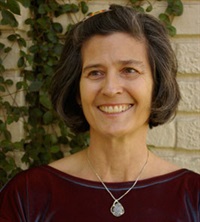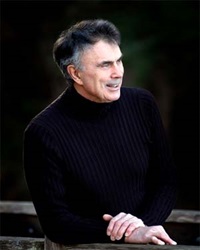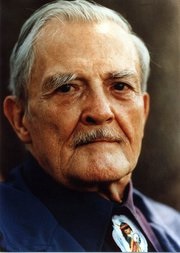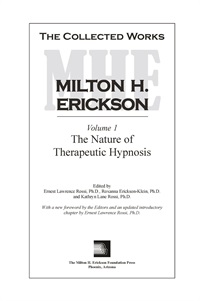The Collected Works of Milton H. Erickson: Volume 01 - Hardcover: The Nature of Therapeutic Hypnosis
- Average Rating:
- Not yet rated
- Topic Areas:
- Ericksonian Psychotherapy | Hypnosis | Neuroscience | Milton Erickson
- Categories:
- Featured | The Collected Works
- Author:
- Roxanna Erickson Klein, RN, PhD, LPC, LCDC | Ernest Rossi, PhD | Kathryn Rossi, PhD | Milton H. Erickson MD
- Copyright:
-
2007
- Publisher:
- The Milton H. Erickson Foundation Press
- Number of Pages:
- 383
- License:
- Never Expires.
Description
Erickson’s experimental and therapeutic explorations with the hypnotic modality span more than 50 years. His successful rejuvenation of the entire field may be attributed to his development of the nonauthoritarian approaches to suggestion wherein subjects learn how to experience hypnotic phenomena and how to utilize their own potentials to solve problems in their own way. The contents of this volume can be best understood as working papers on a journey of discovery. There is little that is fixed, final, or permanently validated about them. Most of these papers are heuristics that can stimulate the mind of the reader and evoke the awe of discovery, which is unlimited in the realm of human consciousness.
Table of Contents
- Exploring the Nature of Consciousness and Hypnosis
- The Neuroscience of Therapeutic Hypnosis, Psychotherapy, and Rehabilitation
- Initial Experiments Investigating the Nature of Hypnosis
- Further Experimental Investigation of Hypnosis” Hypnotic and Non-Hypnotic Realities
- A Special Inquiry with Aldous Huxley into the Nature and Character of Various States of Consciousness
- Autohypnotic Experiences of Milton H. Erickson
- Naturalistic and Utilization Approaches to Therapeutic Hypnosis
- Historical Note on the Hand Levitation and Other Ideomotor Techniques
- Deep Hypnosis and Its Induction
- Naturalistic Techniques of Hypnosis
- Further Clinical Techniques of Hypnosis: Utilization Techniques
- Minimal Cues, Mirror Neurons and Rapport in Therapeutic Hypnosis
- Respiratory Rhythm in Trance Induction: The Role of Minimal Sensory Cues in Normal and Trance Behavior
- An Indirect Induction of Trance: Simulation and the Role of Indirect Suggestion and Minimal Cues
- The “Surprise” and “My-Friend-John” Techniques of Hypnosis: Minimal Cues and Natural Field Experimentation
- Observation and Training in Therapeutic Hypnosis
- Expectancy and Minimal Sensory Cues in Hypnosis
- Notes on Minimal Cues in Vocal Dynamics and Memory
- Clinical and Experimental Trance: Hypnotic Training and Time Required for Their Development
- Laboratory and Clinical Hypnosis: The Same or Different Phenomena?
- The Experience of Interviewing in the Presence of Observers
Credits
Author

Roxanna Erickson Klein, RN, PhD, LPC, LCDC Related Seminars and Products
Roxanna Erickson Klein, RN, PhD, is a registered nurse for more than 40 years, Roxanna has a passion for the interface for psychological and physical medicine. She has special training in the treatment of recovery from chemical dependency and is currently working on a license in counseling.

Ernest Rossi, PhD Related Seminars and Products
Ernest L. Rossi, PhD, is an internationally renowned therapist, teacher and pioneer in the psychobiology of mind-body healing. The author of more than 24 professional books, Dr. Rossi worked with Milton Erickson for eight years and co-authored three classic volumes on therapeutic hypnosis with him. Rossi has also edited four volumes of Erickson's Collected Papers and four volumes of Erickson's Seminars, Workshops and Lectures. He has been conducting research in the psychosocial genomics of ultradian rhythms and their relation to mind-body healing and psychotherapy for over three decades.

Kathryn Rossi, PhD Related Seminars and Products
Kathryn Rossi, Ph.D, is a licensed psychologist and certified yoga instructor (RYT 500). She recently co-edited the 16-volume Collected Works of Milton H. Erickson. She and Ernest Rossi are in private practice in Los Osos, Calif.

Milton H. Erickson MD Related Seminars and Products
Milton H. Erickson, MD, was an American psychiatrist who specialized in medical hypnosis and family therapy. He was founding president of the American Society for Clinical Hypnosis and noted for his approach to the unconscious mind as creative and solution-generating.
Dr. Erickson was plagued with enormous physical handicaps for most of his life. At age 17, he contracted polio and was so severely paralyzed that doctors believed he would die. While recovering in bed, almost entirely lame and unable to speak, he became strongly aware of the significance of nonverbal communication – body language, tone of voice, and the way that these nonverbal expressions often directly contradicted the verbal ones. He also began to have “body memories” of the muscular activity of his own body. By concentrating on these memories, he slowly began to regain control of parts of his body to the point where he was eventually able to talk and use his arms again. His doctor recommended exercising his upper body only so Milton Erickson planned a 1,000 miles canoe trip to build up the strength to attend college. His adventure was challenging, and although he still did not have full use of his legs at the end, he was able to walk with a cane.
The Ericksonian approach departs from traditional hypnosis in a variety of ways. While the process of hypnosis has customarily been conceptualized as a matter of the therapist issuing standardized instructions to a passive patient, Ericksonian hypnosis stresses the importance of the interactive therapeutic relationship and purposeful engagement of the inner resources and experiential life of the subject. Dr. Erickson revolutionized the practice of hypnotherapy by coalescing numerous original concepts and patterns of communication into the field.
The novel psychotherapeutic strategies which Dr. Erickson employed in his treatment of individuals, couples, and families derived from his hypnotic orientation. Although he was known as the world’s leading hypnotherapist, Dr. Erickson used formal hypnosis in only one-fifth of his cases in clinical practice.
Dr. Erickson effected a fundamental shift in modern psychotherapy. Many elements of the Ericksonian perspective which were once considered extreme are now incorporated into the mainstream of contemporary practice.


